(完整版)人教版PEP五年级英语下册各单元知识点
- 格式:doc
- 大小:50.18 KB
- 文档页数:8

Unit 1 This Is My Daydo morning exercises晨练eat breakfast吃早饭have english class上英语课play sports进行体育运动eat dinner吃晚饭when什么时候evening夜晚;晚上get up起床at在……点钟usually通常;一般noon中午climb mountains爬山go shopping购物;买东西play the piano弹钢琴visit grandparents看望祖父母go hiking去远足weekend周末often经常sometimes有时候话题1:日常生活时态:一般现在时1.When do you do morning exercises? 你什么时候做早操?I usually do morning exercises at 8:00. 我经常八点钟做早操。
(I usually get up at 12:00 at noon . 我经常在中午十二点起床。
) 2.When do you eat dinner ? 你什么时候吃晚餐?I eat dinner at 7:00 in the evening. 我在晚上七点种吃晚餐。
3.When is the best time to go to Beijing? Fall. 最好在什么时候去北京?秋天。
Unit 2 My Favourite Seasonspring春天summer夏天fall秋天winter冬天season季节which哪一个best最;极swim游泳fly kites放风筝skate滑冰make a snowman堆雪人plant trees种树why为什么because因为sleep 睡觉话题2:季节时态:一般现在时1.Which season do you like best ? I like spring best.(Spring.)你最喜欢是什么季节?我最喜欢春季。

PEP小学英语五年级下册各单元知识重点总结Unit 1: My School- Grammar: Singular and plural nouns, possessive 'sUnit 2: My Family- Vocabulary: mother, father, sister, brother, grandparents- Grammar: The verb 'to be' (am, is, are) to describe family membersUnit 3: Out and About- Vocabulary: park, zoo, museum, supermarket, post office- Grammar: Present continuous tense to talk about actions happening nowUnit 4: Let's Eat!- Vocabulary: breakfast, lunch, dinner, fruit, vegetables- Grammar: Imperative sentences to give instructionsUnit 5: At the Farm- Vocabulary: farmer, barn, cow, pig, chicken- Grammar: There is/There are to talk about existenceUnit 6: Our Town- Vocabulary: street, hospital, police station, fire station, city- Grammar: Prepositions of place (in, on, under, behind, next to)Unit 7: Weather Report- Vocabulary: sunny, cloudy, rainy, snowy, windy- Grammar: Adjectives to describe weatherUnit 8: Fun with Friends- Vocabulary: play, sing, dance, swim, draw- Grammar: Simple present tense to talk about daily activitiesUnit 9: In the Ocean- Vocabulary: fish, dolphin, shark, octopus, seahorse- Grammar: Wh- questions using 'What' and 'Where'Unit 10: Happy Holidays- Vocabulary: Christmas, Easter, Halloween, New Year's Day, Thanksgiving- Grammar: Use of can for ability。

人教版小学英语五年级下册各单元知识点Unit 1 At the zooVocabulary1.zoo 动物园2.cage 笼子3.lion 狮子4.elephant 大象5.giraffe 长颈鹿6.bear 熊7.monkey 猴子8.camel 骆驼9.kangaroo 袋鼠10.penguin 企鹅Sentence patterns1.询问动物去哪里了 Where is the lion/elephant/bear?2.描述动物在哪里There’s a lion/elephant/bear in the cage.3.描述动物是什么样的 What does the lion/elephant/bear look like?4.描述动物在做什么 The monkey is jumping./The camel is walking. Unit 2 My school dayVocabulary1.school day 学校日2.subject 学科3.math 数学4.English 英语5.science 科学6.PE 体育7.art 美术8.music 音乐9.Chinese 语文Sentence patterns1.询问你有哪些学科 What subjects do you have?2.询问你最喜欢的学科是什么What’s your favorite subject?3.描述你正在上什么学科I’m having math/English/science class now.4.询问你在哪个班级 What class are you in?Unit 3 At a partyVocabulary1.party 派对2.balloon 气球3.present 礼物4.birthday 生日5.cake 蛋糕6.candle 蜡烛7.card 卡片Sentence patterns1.询问你们在庆祝什么 What are you celebrating?2.询问你送了什么礼物 What present did you bring?3.描述蛋糕上有多少个蜡烛 There are four candles on the cake.4.描述你在派对上吃了什么 I ate cake and drank soda.Unit 4 My clothesVocabulary1.clothes 衣服2.jacket 夹克衫3.shirt 衬衫4.dress 连衣裙5.skirt 短裙6.pants 裤子7.socks 袜子8.shoes 鞋子Sentence patterns1.询问你喜欢穿什么样的衣服 What clothes do you like to wear?2.询问今天你穿了什么衣服 What clothes are you wearing today?3.描述你的外套是什么样的 My jacket is blue.4.描述你的鞋子是什么颜色的 My shoes are red.Unit 5 My familyVocabulary1.family 家庭2.mother 母亲3.father 父亲4.sister 姐妹5.brother 兄弟6.grandmother 奶奶7.grandfather 爷爷8.aunt 阿姨9.uncle 叔叔Sentence patterns1.询问你有几口人家庭 How many people are there in your family?2.询问你和家人一起住吗 Do you live with your family?3.描述你的妈妈是什么样的 My mother is kind.4.描述你和兄弟姐妹的关系很好 My sister and I get along well.。
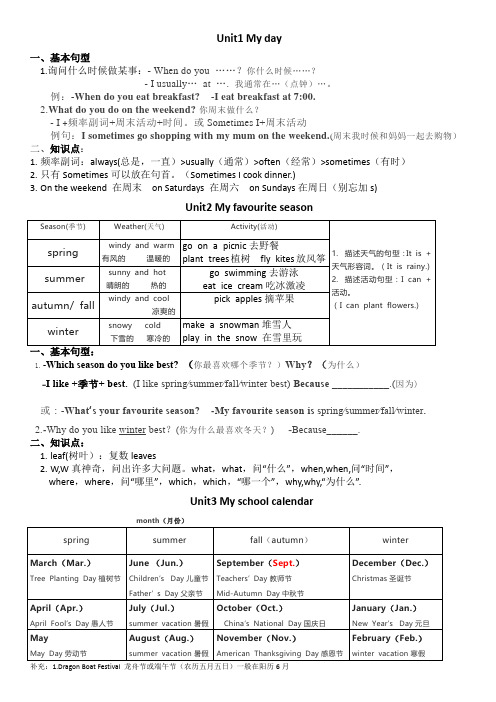
Unit1 My day一、基本句型1.询问什么时候做某事:- When do you ……?你什么时候……?- I usually…at …. 我通常在…(点钟)…。
例:-When do you eat breakfast?-I eat breakfast at 7:00.2.What do you do on the weekend?你周末做什么?- I +频率副词+周末活动+时间。
或Sometimes I+周末活动例句:I sometimes go shopping with my mum on the weekend.(周末我时候和妈妈一起去购物)二、知识点:1.频率副词:always(总是,一直)>usually(通常)>often(经常)>sometimes(有时)2.只有Sometimes可以放在句首。
(Sometimes I cook dinner.)3.On the weekend 在周末on Saturdays 在周六on Sundays在周日(别忘加s)Unit2 My favourite season1.-Which season do you like best? (你最喜欢哪个季节?)Why?(为什么)-I like +季节+ best.(I like spring∕summer∕fall∕winter best) Because ___________.(因为)或:-What‘s your favourite season? -My favourite season is spring∕summer∕fall∕winter.2.-Why do you like winter best?(你为什么最喜欢冬天?) -Because______.二、知识点:1.leaf(树叶):复数leaves2.W,W真神奇,问出许多大问题。
what,what,问“什么”,when,when,问“时间”,where,where,问“哪里”,which,which,“哪一个”,why,why,“为什么”.Unit3 My school calendar补充:1.Dragon Boat Festival 龙舟节或端午节(农历五月五日)一般在阳历6月2.月份首字母大写。
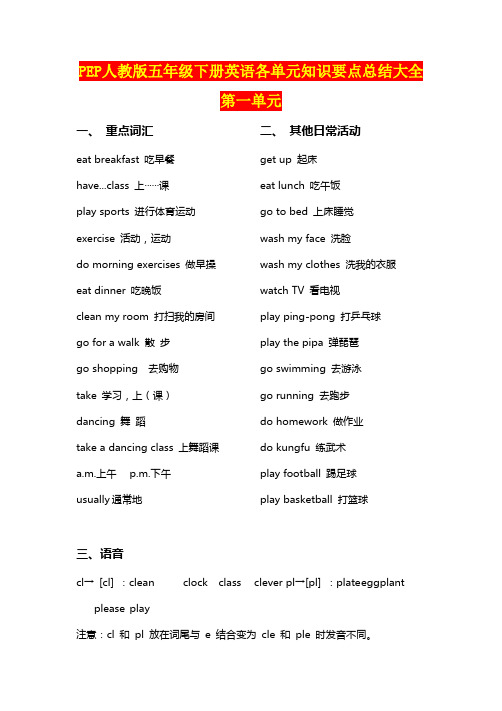
PEP人教版五年级下册英语各单元知识要点总结大全第一单元一、重点词汇eat breakfast 吃早餐have...class 上······课play sports 进行体育运动exercise 活动,运动do morning exercises 做早操eat dinner 吃晚饭clean my room 打扫我的房间go for a walk 散步go shopping 去购物take 学习,上(课)dancing 舞蹈take a dancing class 上舞蹈课a.m.上午p.m.下午usually 通常地二、其他日常活动get up 起床eat lunch 吃午饭go to bed 上床睡觉wash my face 洗脸wash my clothes 洗我的衣服watch TV 看电视play ping-pong 打乒乓球play the pipa 弹琵琶go swimming 去游泳go running 去跑步do homework 做作业do kungfu 练武术play football 踢足球play basketball 打篮球三、语音cl→[cl] :clean clock class clever pl→[pl] :plate e ggplant please play注意:cl 和pl 放在词尾与e 结合变为cle 和ple 时发音不同。
四、频度副词always 总是,一直(100%)usually 通常(80%)often 经常(60%)sometimes 有时(30%)五、疑问词why 为什么when 什么时候六、重点句型1、询问别人什么时候做某事的句型及回答。
句型结构:问:When do you+动词短语原形+其他?(你/你们什么时候做某事?)答:I/we(+频度副词)+动词短语原形+at+具体时间. (我/我们通常在几点做某事。

人教版小学五年级英语下册重点知识总览单元一:Hobbies and Interests- 重点词汇:hobby, interest, collect, stamp, coin, postcard, painting- 重点句型:- What's your hobby?- I like collecting stamps.- My hobby is painting.单元二:At the Park- 重点词汇:park, playground, slide, swing, bench, picnic, kite- 重点句型:- Let's go to the park.- I like playing on the swing.- We can have a picnic in the park.单元三:Animals- 重点词汇:animal, pet, cat, dog, bird, fish, rabbit- 重点句型:- Do you have any pets?- I have a pet cat.- The bird is singing.单元四:Food and Drinks- 重点词汇:food, drink, apple, banana, orange, milk, water- 重点句型:- What's your favorite food?- I like eating apples.- Can I have some water?单元五:Weather and Seasons- 重点词汇:weather, sunny, cloudy, rainy, snowy, spring, summer, autumn, winter- 重点句型:- What's the weather like today?- It's sunny and warm.- I like playing in the snow.单元六:My Family- 重点词汇:family, father, mother, brother, sister, grandfather, grandmother- 重点句型:- How many people are there in your family?- I have one brother and one sister.- My grandparents live with us.单元七:School Life- 重点词汇:school, classroom, teacher, student, desk, chair, book, pen- 重点句型:- What's your favorite subject?- I like English.- We study at school.单元八:Sports and Activities- 重点词汇:sports, activity, football, basketball, volleyball, swimming, dancing- 重点句型:- Do you like sports?- Yes, I like playing football.- Let's go swimming together.单元九:Transportation- 重点词汇:transportation, car, bus, bicycle, taxi, train, subway - 重点句型:- How do you go to school?- I go to school by bus.- I want to take a train.单元十:Occupations- 重点词汇:occupation, doctor, teacher, nurse, firefighter, policeman, musician- 重点句型:- What do you want to be in the future?- I want to be a doctor.- My mom is a teacher.以上是人教版小学五年级英语下册的重点知识总览,希望对你有帮助!。

新人教版PEP 【小学五年级英语下册】单元知识点归纳总结Unit 1 My DayIn this unit。
we learn some core vocabulary words。
phrases。
and XXX.Core Vocabulary:1.Verbs: take (studying)。
go to (class)2.Nouns: dancing。
exercise。
sports3.Phrases: do morning exercises。
eat breakfast。
play sports。
eat dinner。
go for a walk。
go shopping。
clean my room。
take a dancing class。
have a classXXX Vocabulary:1.Verbs: start。
shop。
work。
need。
live。
win。
sound2.Nouns: Spain。
play。
letter。
island。
cave3.ns: after4.XXX: when。
XXX。
a.m。
p.m。
why。
last。
also。
busy5.nal Vocabulary: frequency adverbs (always。
usually。
sometimes)Phrases:watch TV。
eat lunch。
go to bed。
go swimming。
go home。
go to schoolCore Sentence Structure:When do you do morning exercises?" "At 7 o'clock."XXX phrase is "good job" to praise XXX.Which season do you like best。
I like winter best。
This sentence means "which one do you like the most" and "like。

Unit 1 My Day【重点词汇】一、表示一日三餐eat breakfast = have breakfast吃早饭eat dinner= have dinner吃晚饭【拓展】eat lunch = have lunch吃午饭二、表示上什么课:have … class 上……课(1)have a Chinese class 上语文课(2)have a PE class 上体育课(3)have a music class上音乐课(4)have a maths class上数学课(5)have a science class上科学课(6)have an English class上英语课(7)have an art class 上美术课(8)take a dancing class上舞蹈课take a cooking class上烹饪课take学习;上(课)dancing跳舞;舞蹈三、与运动相关词组play sports进行体育活动do morning exercises晨练go for a walk散步play football踢足球play basketball打篮球play ping-pong打乒乓球四、日常生活相关clean my room打扫我的房间wash my face洗脸wash my clothes洗衣服get up 起床go to bed上床睡觉watch TV看电视do homework做家庭作业go shopping去购物go fishing去钓鱼go swimming去游泳go hiking去远足五、频度副词1.什么是频度副词?表示动作频率的词被称为“频度副词”,例如:usually/sometimes/always/等,这些词在程度上有区别。
2.常见频度副词按频率大小排列如下:always(100%)>usually(80%)>often(60%)>sometimes(20%~40%)> never (0%)3.注意频度副词的使用位置:①We usually go to school at seven in the morning.②What do you often do on the weekend?六、常见时间的表达方式1.at + 具体的几点钟;at noon在中午;at night在晚上2.in +月份/季节/早中晚例如:in the morning/afternoon/evening3.关于on表示时间的几种情况:①on + 星期几;②on + 几月几日;③on the weekend在周末;④on Monday morning星期一早上。

人教版PEP小学英语五年级下册知识点汇总(最新)Unit One: This Is My DayBasic Vocabulary:Activities: get up。
do morning exercises。
have English class。
play sports。
play the piano。
climb mountains。
go shopping。
go hiking。
visit grandparents。
eat breakfast。
eat dinner.Basic XXX Structures:1.Asking about daily routines:When do you。
(你什么时候。
)XXX I。
(我通常在。
(点钟)。
(做什么事)。
有时。
)XXX: When do you go to school。
(你每天几点去上学?)I usually go to school at 7:00.Sometimes I go to school at7:10.2.Asking about XXX:What do you do on the weekend。
(你周末做什么?)XXX I。
(我通常/经常。
有时。
)XXX: What do you do on the weekend?I often play XXX I go shopping with my mom.3.Introducing one's own habits:Every weekend。
I go hiking。
(我每个周末远足。
)Every day。
I do my homework at 8:00 in the evening。
(我每天晚上8点做作业。
)4.Asking XXX:What do you do。
(你是干什么的?)Time:morning。
afternoon。
evening。
noon。
at night。
6:00.on Sunday。

人教版PEP小学英语五年级下册知识点汇总Unit One This Is My Day【基本词汇】:Activities(活动) Time(时间)频率词get up 起床do morning exercises 晨练 have English class上英语课 play sports 进行体育活动 play the piano 弹钢琴climb mountains 爬山go shopping 购物go hiking 去远足visit grandparents 看望外/祖父母eat breakfast 吃早饭eat dinner 吃晚饭morning 早上in the afternoon下午evening 晚上noon 中午at night 夜晚6:00 具体时间on Sunday 在星期天when 什么时候always总是usually通常often经常sometimes有时seldom很少never从不注:表格拉长排版乱的话把手机横过来就OK啦【基本句型】:1. 询问生活规律:---- When do you ……?你什么时候……?---- I usually… at …Sometimes I….我通常在…(点钟)…(做什么事)。
有时…E.g. --- When do you go to school ? 你每天几点去上学?--- I usually go to school at 7:00. Sometimes I go to school at 7:10.2. 询问生活习惯:--- What do you do on the weekend? 你周末做什么?--- I usually / often ….. Sometimes I …..E.g. --- What do you do on the week?--- I often play football. Sometimes I go shopping with my mom.3. 介绍自己的生活习惯:Every weekend I go hiking. 我每个周末远足。

新人教版PEP五年级英语下册各单元知识点总结Unit 1: Our Classroom- Classroom objects and their names- Sentences to describe classroom objects and their locationsUnit 2: Our Clothes- Clothing items and their names- Describing clothing using colors and patterns- How to ask and answer questions about what someone is wearingUnit 3: I Love Sports- Sports vocabulary and their names- Describing sports using adjectives (e.g., fun, exciting, tiring)- Expressing preferences for certain sportsUnit 4: My Birthday Party- Vocabulary related to birthdays and celebrations- Describing activities at a birthday party- Expressing likes and dislikes about different party elementsUnit 5: At the Farm- Vocabulary related to farm animals and their names- Describing farm animals using adjectives (e.g., big, small, noisy) - Describing activities at a farm (e.g., feeding animals, milking cows)Unit 6: A Fun Day Out- Vocabulary related to amusement park rides and activities- Describing activities and experiences at an amusement park- Expressing likes and dislikes about different rides and activitiesUnit 7: A Friendly Letter- Vocabulary related to writing a letter (e.g., greeting, closing, signature)- Structure of a friendly letter- Writing a letter to a friend, describing personal experiences or activitiesUnit 8: Our Pets- Vocabulary related to pets and their names- Describing pets using adjectives (e.g., cute, friendly, playful)- Talking about responsibilities and caring for petsUnit 9: Our Earth- Vocabulary related to the environment and nature- Describing different natural elements (e.g., mountains, rivers, plants)- Expressing concerns and suggesting actions to protect the environmentUnit 10: Fun with Art- Vocabulary related to art and artistic activities- Describing different art forms (e.g., drawing, painting, sculpting) - Talking about personal preferences for different art activitiesUnit 11: Let's Travel- Vocabulary related to travel and transportation- Describing different modes of transportation (e.g., car, train, airplane)- Talking about travel experiences and preferences for different destinationsUnit 12: Healthy Habits- Vocabulary related to health and healthy habits- Describing different healthy habits (e.g., exercise, balanced diet, enough sleep)- Talking about personal choices and habits for a healthy lifestyle。

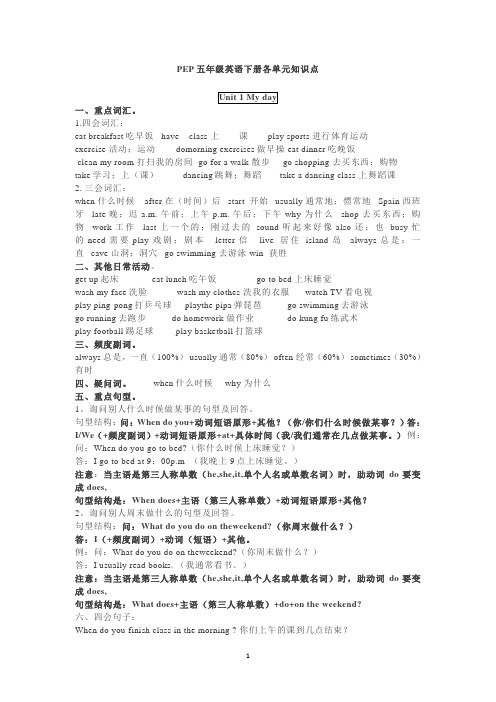
PEP五年级英语下册各单元知识点Unit 1 My day一、重点词汇。
1.四会词汇:eat breakfast吃早饭 have···class 上······课 play sports 进行体育运动exercise 活动;运动 domorning exercises做早操 eat dinner吃晚饭clean my room 打扫我的房间 go for a walk 散步 go shopping 去买东西;购物take学习;上(课) dancing跳舞;舞蹈 take a dancing class 上舞蹈课2. 三会词汇:when什么时候after 在(时间)后start 开始usually 通常地;惯常地Spain 西班牙late 晚;迟 a.m. 午前;上午 p.m. 午后;下午 why 为什么shop 去买东西;购物work 工作last 上一个的;刚过去的sound 听起来好像 also 还;也 busy 忙的 need 需要 play 戏剧;剧本letter 信live 居住island 岛always 总是;一直cave 山洞;洞穴go swimming 去游泳 win 获胜二、其他日常活动。
get up起床 eat lunch吃午饭 go to bed 上床睡觉wash my face洗脸 wash my clothes 洗我的衣服 watch TV看电视play ping-pong打乒乓球 playthe pipa弹琵琶 go swimming去游泳go running去跑步 do homework 做作业 do kung fu练武术play football踢足球 play basketball打篮球三、频度副词。
always总是,一直(100%) usually通常(80%) often 经常(60%) sometimes(30%)有时四、疑问词。

人教版PEP五年级英语下册各单元语法点Unit 1: What Does She Do?- 一般现在时:用于描述日常活动或惯。
主语为第三人称单数时,动词加-s或-es。
- 观察寻找规律:第三人称单数的动词加-s或-es。
- Be动词+动词-ing:用于描述正在进行的动作。
主语为第三人称单数时,be动词用is。
- 一般现在时的否定句:在动词前面加don't/doesn't。
- 一般现在时的疑问句:将do/does置于主语之前。
Unit 2: Can You Run?- Can的用法:用于表示能力和询问对方是否能够做某事。
- Can的否定形式:在can后面加not或缩略形式can't。
- Can的疑问形式:将can置于句首。
Unit 3: What Are They Doing?- 现在进行时:用于描述正在进行的动作。
动词加-ing。
- 现在进行时的否定句:在be动词后面加not。
- 现在进行时的疑问句:将be动词置于句首。
Unit 4: I'm Sitting at the Front.- 介词短语表示地点:用于描述人或物所在的位置。
- 介词on、in、under、behind、in front of、next to等的用法。
Unit 5: What Are You Going to Do?- be going to的用法:表示将来要做的事情。
- be going to的否定形式:在be动词后面加not。
- be going to的疑问形式:将be动词置于句首。
Unit 6: It's Raining!- 祈使句:用于表示请求、命令或建议。
动词原形作谓语。
- 祈使句的否定形式:在动词前面加don't。
- 祈使句的疑问形式:用Do开头。
Unit 7: How Often Do You Exercise?- 表示频率的副词:用于描述动作发生的频率。
- always, usually, often, sometimes, hardly ever, never等的用法。
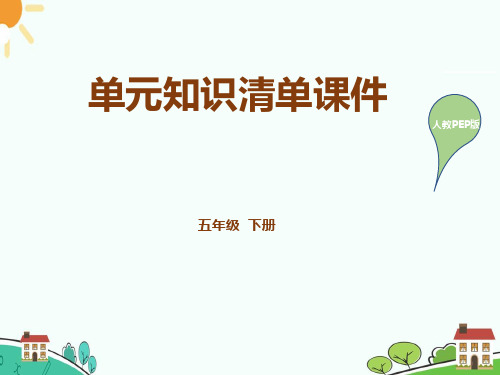

人教版P E P小学英语五年级下册u n i t1至u n i t3知识点归纳-CAL-FENGHAI.-(YICAI)-Company One1五年级下册Unit 1-3重点难点、单元单词、短语和知识点知识梳理第一单元知识点一、主要单词:do morning exercises晨练,做早操 eat breakfast吃早饭 have English class上英语课 play sports进行体育活动 eat dinner吃晚饭 eat lunch吃午饭 climb mountains爬山 go shopping购物,买东西 play the piano弹钢琴 visit grandparents看望(外)祖父母 go hiking去远足二、主要句子:When do you eat dinner你什么时候吃晚饭I eat dinner at 7:00 in the evening.我晚上七点吃晚饭。
When do you get up你什么时候起床I usually get up at 12:00 at noon.我通常在中午12点起床。
What do you do on the weekend你在周末干什么Usually I watch TV and go shopping.我通常看电视和购物。
Sometimes I visit my grandparents.有时候我去看望我的外祖父母。
I often play football.我经常踢足球。
Sometimes I go hiking.有时候我去远足。
三、同义词eat breakfast—have breakfast eat lunch—have luncheat dinner—have dinner play sports—do sports usually—often复数形式:policeman—policemen policewoman—policewomen现在分词:tell—telling三单:say—says同义句:What do you do ---What are you你是干什么的四、表示频度的副词:always总是,一直 usually通常,常常 often经常 sometimes有时候五、以复数形式出现的词组:visit grandparents plant trees介词后跟表示时间的词语时,表示在某年、某月、某个季节,某个时候(在上午,在下午,在晚上)用in;表示在某一天,在星期几用on,在具体的几点几分用at.七、too 和either的用法区别:too和either都是“也”的意思,但too用于肯定句,either用于否定句。

人教版PEP五年级英语下册各单元词汇点本文档为人教版PEP五年级英语下册各单元词汇点完整版,共分为8个单元,涵盖了该课程下所有的单词和词组。
Unit 1 Things I like to do1. skateboard 溜冰板2. roller-skate 溜直排轮3. ride a bike 骑自行车4. play football 踢足球5. play basketball 打篮球6. play table tennis 打乒乓球7. play video games 玩电子游戏8. watch TV 看电视Unit 2 What's the weather like?1. sunny 晴朗2. cloudy 多云3. rainy 下雨4. snowy 下雪5. windy 有风6. hot 热7. cold 冷Unit 3 At a pet shop1. parrot 鹦鹉2. rabbit 兔子3. hamster 仓鼠4. cat 猫5. dog 狗6. fish 鱼7. turtle 乌龟Unit 4 My family 1. grandfather 爷爷2. grandmother 奶奶3. father 爸爸4. mother 妈妈5. older brother 哥哥6. older sister 姐姐7. younger brother 弟弟8. younger sister 妹妹Unit 5 My school day1. classroom 教室2. library 图书馆3. playground 操场4. art room 美术室5. music room 音乐室7. canteen 食堂8. restroom 卫生间Unit 6 Fun with nature1. flowers 花2. grass 草3. trees 树木4. leaves 叶子5. rocks 石头6. mountains 山7. rivers 河流Unit 7 Countryside holidays1. tent 帐篷2. sleeping bag 睡袋3. campfire 篝火4. fishing rod 钓鱼竿5. boat 船6. bike 自行车7. camera 照相机Unit 8 Where's my schoolbag?1. schoolbag 书包2. desk 课桌3. chair 椅子4. blackboard 黑板5. pencil case 铅笔盒6. ruler 尺子7. eraser 橡皮擦以上为本文档的单词和词组列表,希望能够帮助学习人教版PEP五年级英语下册的同学们更好地掌握课程内容。
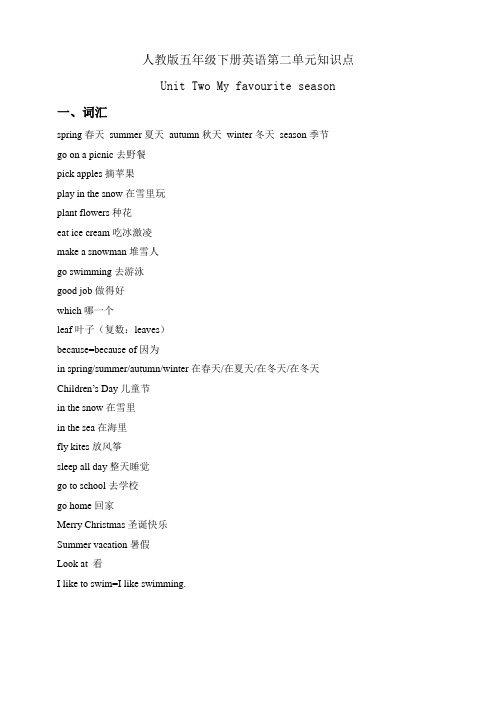
人教版五年级下册英语第二单元知识点Unit Two My favourite season 一、词汇spring春天summer夏天autumn秋天winter冬天season季节go on a picnic去野餐pick apples摘苹果play in the snow在雪里玩plant flowers种花eat ice cream吃冰激凌make a snowman堆雪人go swimming去游泳good job做得好which哪一个leaf叶子(复数:leaves)because=because of因为in spring/summer/autumn/winter在春天/在夏天/在冬天/在冬天Children’s Day儿童节in the snow在雪里in the sea在海里fly kites放风筝sleep all day整天睡觉go to school去学校go home回家Merry Christmas圣诞快乐Summer vacation暑假Look at 看I like to swim=I like swimming.二、语法(一)Which引导的特殊疑问句,就最喜欢的季节是哪一个进行提问Which season do you like best?回答:I like+季节+best.或者I like+季节.或者直接说季节名称。
拓展:What is your favourite season?回答: My favourite season is+季节.季节+is my favourite season.(二)What引导的特殊疑问句,就天气进行提问What is the weather like today?回答:It is......(三)What引导的特殊疑问句,就在某一个季节做某事进行提问What do you often do in +季节?回答:I often+具体的事情.三、重要句子Which season do you like best?I like spring best.Why do you like autumn best?Because the colours are pretty.There are beautiful flowers everywhere.I can sleep all day.How about you?=What bout you?I like summer best.because of Children’s Day.Look at my picture.The weather is good and the colours are beautiful.There is lots of snow.I want to paint a picture ,too.What is your favourite season?My favourite season is spring四、语音(辅音字母组合发音)①br发音为/br/br own li br ary br other um br ella br eakfast②gr发音为/gr/gr een gr apes gr andpa gr ow gr ass gr eat五、拓展①Why和because的用法Why 引导询问原因的特殊疑问句。
PEP五年级英语下册各单元知识点Unit 1 My day一、重点词汇。
1.四会词汇:eat breakfast吃早饭 have···class 上······课 play sports 进行体育运动exercise 活动;运动 domorning exercises做早操 eat dinner吃晚饭clean my room 打扫我的房间 go for a walk 散步 go shopping 去买东西;购物take学习;上(课) dancing跳舞;舞蹈 take a dancing class 上舞蹈课2. 三会词汇:when什么时候after 在(时间)后start 开始usually 通常地;惯常地Spain 西班牙late 晚;迟 a.m. 午前;上午 p.m. 午后;下午 why 为什么shop 去买东西;购物work 工作last 上一个的;刚过去的sound 听起来好像 also 还;也 busy 忙的 need 需要 play 戏剧;剧本letter 信live 居住island 岛always 总是;一直cave 山洞;洞穴go swimming 去游泳 win 获胜二、其他日常活动。
get up起床 eat lunch吃午饭 go to bed 上床睡觉wash my face洗脸 wash my clothes 洗我的衣服 watch TV看电视play ping-pong打乒乓球 playthe pipa弹琵琶 go swimming去游泳go running去跑步 do homework 做作业 do kung fu练武术play football踢足球 play basketball打篮球三、频度副词。
always总是,一直(100%) usually通常(80%) often 经常(60%) sometimes(30%)有时四、疑问词。
when什么时候 why 为什么五、重点句型。
1、询问别人什么时候做某事的句型及回答。
句型结构:问:When do you+动词短语原形+其他?(你/你们什么时候做某事?)答:I/We(+频度副词)+动词短语原形+at+具体时间(我/我们通常在几点做某事。
)例:问:When do you go to bed?(你什么时候上床睡觉?)答:I go to bed at 9:00p.m (我晚上9点上床睡觉。
)注意:当主语是第三人称单数(he,she,it,单个人名或单数名词)时,助动词do要变成does,句型结构是:When does+主语(第三人称单数)+动词短语原形+其他?2、询问别人周末做什么的句型及回答。
句型结构:问:What do you do on theweekend?(你周末做什么?)答:I(+频度副词)+动词(短语)+其他。
例:问:What do you do on theweekend?(你周末做什么?)答:I usually read books. (我通常看书。
)注意:当主语是第三人称单数(he,she,it,单个人名或单数名词)时,助动词do要变成does,句型结构是:What does+主语(第三人称单数)+do+on the weekend?六、四会句子:When do you finish class in the morning ? 你们上午的课到几点结束?We finish class at 1 o’clock .我们一点钟结束上午的课。
What do you do on the weekend ? 你周末做什么?I often watch TV and play ping-pong with my father . 我经常看电视,也常和我爸爸一起打乒乓球。
七、语音:cl /kl/ clean clock class cleverpl /pl / plate eggplant please playUnit 2 My favourite season一、重点词汇1. 四会:spring 春天 summer 夏天 autumn秋天 winter冬天 season季节picnic野餐 goon a picnic 去野餐 pick摘;采集 pick apples摘苹果snowman雪人 make a snowman 堆雪人 go swimming去游泳2. 三会:which哪一个 best最;最高程度地snow 雪good job 做得好because 因为vacation 假期all 全;完全pink 粉色;粉色的lovely可爱的;美丽的leaf 叶子(复数leaves)fall 落下;(美式)秋天paint 用颜料绘画二、其他1、形容天气的形容词 hot 炎热的warm暖和的rainy多雨的windy 多风的cold 寒冷的cool凉爽的sunny晴朗的cloudy 多云的snowy下雪的2、由go构成的活动短语go swimming去游泳go shopping去购物 go boating去划船go skating去滑冰 gohiking去远足 go fishing去钓鱼三、重点句型1、询问别人天气怎么样的句型及回答。
句型结构:问:What’sthe weather like+时间+地点?(······天气怎么样?)答:It’s+表示天气的形容词例:问:What’s the weather like in winter in Beijing?(北京冬天的天气怎么样)答:It’s cold and windy.(有风而且寒冷。
)2、询问别人最喜欢的季节句型及回答。
句型结构:问:Which season do you likebest? (你最喜欢的季节是哪一个?)答:I like+季节+best或直接说季节名称。
同义句还有:What’s your favourite season?3、询问别人喜欢某个季节的原因的句型及回答。
句型结构:问:Why do you like+季节名称?或直接用“Why”来提问。
答:一般要用“because”引导的句子来说明理由,可以从天气相关的活动等方面来说。
例:问:Why do you likespring?(你为什么喜欢春天?)答:Because I can fly kites.(因为我能放风筝。
)问:Why do you like summer?(你为什么喜欢夏天?)答:Because I can go swimmingeveryday.(因为我每天都能去游泳。
)问:Why do you like autumn?(你为什么喜欢秋天?)答:Because the weather is cool.(因为天气凉爽。
)问:Why do you like winter?(你为什么喜欢冬天?)答:Because I can make a snowman.(因为我能堆雪人。
)四、四会句子:Which season do you like best , Mike ? 迈克,你最喜欢哪个季节?Winter . 冬天。
Why ?为什么?Because I like summervacation ! 因为我喜欢暑假!五、语音:br /br/ brown library brother umbrellagr /gr/ green grapes grandpa growUnit 3 My school calendar一、重点词汇1.四会:January(Jan.)一月February(Feb.)二月 March(Mar.)三月 April(Apr.)四月May五月 June(Jun.)六月July(Jul.)七月 August(Aug.)八月 September (Sept.)九月October(Oct.)十月 November(Nov.) 十一月 December(Dec.)十二月2. 三会:few 不多;很少 a few一些thing事情meet 聚会;开会 sports meet 运动会 Easter 复活节trip 旅行 year 年plant 种植contest 比赛;竞赛theGreat Wall 长城national 国家的National Day 国庆日 American 美国的Thanksgiving 感恩节Christmas 圣诞节holiday 假日;节日game 游戏 roll 滚动lookfor 寻找 chocolate 巧克力bunny (用作儿语)兔子RSVP (尤用于请柬)请赐复by在...... 之前注意:1、月份的首字母一定要大写。
2、May没有缩写形式,September的缩写形式是“Sept.”,其他月份单词的缩写形式都是有单词的前三个字母加“·”构成。
3、月份的缩写形式不用在句子中,只能单独使用。
4、表示“在几月”时,要在月份单词前面加介词in, 但在几月几日用on。
二、常用节假日名称。
New Year’s Day元旦(1.1) Tree Planting Day 植树节(3.12) Easter 复活节April Fool’s Day愚人节(4.1)May Day 劳动节(5.1)Mother’s Day母亲节(每年五月的第二个星期天)Children’s Day儿童节(6.1)Father’s Day父亲节(每年六月的第三个星期天)Teachers’ Day教师节(9.10)China’s National Day国庆节(10.1)Mid-Autumn Day 中秋节(农历八月十五)Thanksgiving Day 感恩节(11月第4个周四) Christmas圣诞节(12.25)summer vacation暑假 winter vacation寒假三、活动名称sports meet 运动会 Easterparty 复活节聚会 school trip 学校旅行Chinese test 语文测试 singingcontest歌咏比赛 birthday party生日聚会四、介词in 、on、 at的用法。
1、in后面+上午/下午/晚上/月份/季节/年份。
如:inthe morning, in April, in winter, in 2015.2、on的后面+具体的某一天。
如:onMonday, on April 3rd, on Friday morning.3、at后面+具体的时间点或与其他词构成固定搭配。
如:at six o’clock, at 12:30,at noon.五、重点句型。